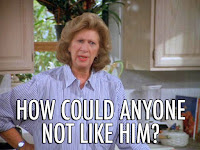If you're one of the many writers asking, "What's so evil about modifiers anyway?" I don't blame you for not getting it. Too many of us have fallen victim to our culture's lazy standards of writing, perpetuated by the shorthand of social media and the explosion of self-published books that go unedited, unchecked, and are held unaccountable.
So what's the big deal about overusing modifiers? Well, let's see.
First: The Modifier
Essentially, a modifier adds information to another element in a sentence. The man didn't just walk from the room, he walked from the room slowly. A modifier can be an adjective, an adverb, or a phrase or clause acting as an adjective or adverb.Ok, so, modifiers are words that modify things. With me so far?
Second: The Problem
Modifiers kill creative writing. Verbs should be a writer's best friend, not modifiers. Verbs lend action and speed and interest, but if you're not using the correct verbs you'll find yourself falling on too many modifiers to make up for your lazy verb selection. The end result is sloppy looking writing.EXAMPLE
"The thief slipped stealthily into the room."
A writer who doesn't understand the misuse of modifiers won't see anything wrong with that sentence, but let's take a closer look at the problem.
The thief is the subject of this sentence. Slipped is the verb that describes his action. Stealthily is the modifier adding a descriptive element to the verb. The main problem with this example is that the modifier is unnecessary. Why is the modifier unnecessary? Because we have an inappropriate verb.
Slipped.
What does this even mean? Is the thief sliding along the floor here? Is there a banana peel in the dark? Is he disco dancing? This verb doesn't quite describe our scene. Slipped is something a stealthy thief would prefer NOT to do, I would imagine.
Let's try again.
"The thief snuck stealthily into the room."
Better. Snuck is a much better word for a stealthy thief than slipped. It could just as easily be crept or tiptoed or skulked, depending on what mood you're trying to set or your personal preference.
But now we have another problem. Remember our modifier Mr. Stealthily? He is now making the verb redundant since the word snuck implies stealth.
Let's try again... again.
"The thief snuck into the room."
Ahhh! There we go. And now we have a tightly written sentence. It's succinct. It conveys a good mental image. There are no redundant or unnecessary modifiers and the verb is strong, implying a specific action while still allowing the reader to use their imagination to conjure the scene. If you want to convey more information about the thief's movements or his demeanor, get creative!
"The thief snuck into the room, a shadow of menace and ill intent."
Ok, it's an elementary example, I admit, but hopefully this process shows you how cutting out modifiers forces a more creative use of proper verbs and can lead to stronger, more descriptive sentences.
An Example From My Own Work
In Where Evil Abides, the second volume in my high fantasy series Children of the Falls, one of my heroes starts a fight. In the first draft, the sentence read like this:"Merek jumped over the food table and overturned it, pushing the soldiers back, but only momentarily."
There are several things I didn't like about this sentence, but for the purposes of this article I'll deal with the modifier.
I realized that the word "momentarily"—a modifier—is a useless word. Is it worth it to emphasize that Merek's actions distracted the soldiers for only a moment? Doesn't the action in the next sentence imply the next moment? What does this modifier do except waste the reader's time?
I decided to get aggressive and axed everything after the comma.
"Merek vaulted over the food table and kicked it over, pushing the soldiers back."
Vaulted was a more appropriate verb to describe the specific action, while the verb "kicked" gave the sentence a little extra, well... kick.
As for the modifer? Gonzo!
Reality Check
Are modifiers NEVER supposed to be used? There are some purists out there who might think the first sentence about the slippery thief is an abomination. There are also some very lazy writers who look at some of today's top selling fiction, see lots of modifiers, and think it's no big deal.I'm somewhere in the middle. I try not to use modifiers, but I'm also the kind of person who writes by feel. If I feel that a sentence flows better with a modifier as opposed to a verb, I might go with the modifier, but that's AFTER I've already assessed the sentence to see if there isn't a stronger verb that works for the scene.
Here's An Exercise
Do a search throughout your document of all words that end in "ly" and get rid of them. Nine times out of ten an "ly" word is a modifier. I guarantee that most of those modifiers can be deleted without changing the meaning of the sentence. In many cases you may have to hunt for a more descriptive verb, and in other instances you may need to rework your sentence entirely. You'll find your writing getting stronger and stronger the more modifiers you hack out.So hack away!













